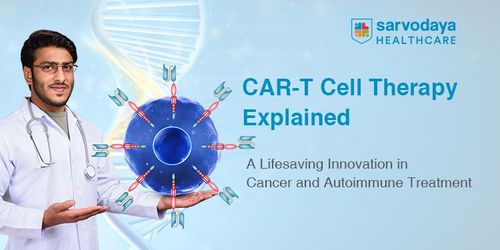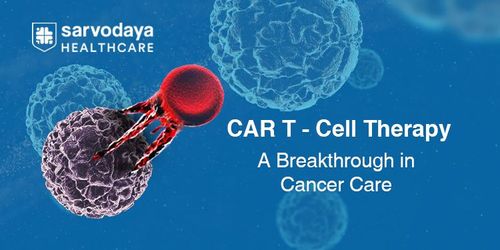Overview
CAR T-cell Therapy is an advanced immunotherapy that transforms your immune cells into enhanced cancer fighters. This treatment modifies your T-cells ( a type of white blood cell in the immune system) by adding special structures known as Chimeric Antigen Receptors (CARs).
(Receptors are the surface proteins of the immune cells. They recognise cells with abnormal antigens. Antigens are the surface proteins of the intruder cells, viruses, bacteria or more.)
These receptors enable the T-cells to recognise and attack cancer cells by identifying antigens. It's like equipping your immune cells with a highly accurate GPS that helps them detect and destroy harmful cancer cells effectively. This targeted approach is especially effective against certain types of blood cancer.
How Does CAR T-cell Therapy Work?
In CAR T-cell therapy, patients' T-cells are extracted from their bodies and genetically engineered in the laboratory to form Chimeric Antigen Receptors (CARs). These artificial receptors are then leveraged to redirect T-cells into the immune system of the patient to recognise and target antigens found on specific cancer cells.
- Cancer Detection: The accurate type of cancer is detected, and as per experts’ opinions, CAR T-cell Therapy is planned.
- Extraction of T-cells: Patient’s T-cells are extracted from their blood through a process called leukapheresis.
- Cell Multiplication: The extracted T-cells are then multiplied in the laboratory.
- Chimeric Antigen Receptors: The antigen present on the detected cancer cell is mixed with a virus and added to the multiplied T Cells of the patient. These antigens deposit on the surface of the T-cells and form Chimeric Antigen Receptors(CARs).
- Modified T-cells: CARs are designed to recognise the specific proteins on the surface of cancer cells (antigens).
- Infusion of CAR T-cells in the Patient’s Body: These engineered cells are then injected into the patient’s bloodstream, well capable of recognising and targeting the cancer cells.
- Destruction of Cancer Cells: The T-cells bind to the specific antigens on cancer cells and destroy them.
Why is CAR T-cell Therapy Required?
CAR T-cell Therapy is effective for battling certain blood cancers, particularly when other treatments haven’t been successful. At Sarvodaya Hospital, Faridabad, the CAR T-cell therapy is currently used to treat various types of haematological malignancies, each with unique challenges:
- Acute Lymphoblastic Leukemia (ALL): A fast-growing cancer of the white blood cells, which can overwhelm healthy cells quickly, making timely and effective treatment essential.
- Mantle Cell Lymphoma: It is a rare and often aggressive subtype of non-Hodgkin lymphoma that typically affects older adults, requiring innovative therapies for management.
- B-cell Lymphomas: These are types of non-Hodgkin lymphoma that arise from the B cells (a type of white blood cell), which can vary widely in how they behave and respond to treatment.
- Multiple Myeloma: This cancer affects plasma cells in the bone marrow, disrupting normal blood cell production and immune responses, often leading to severe complications without effective treatment.
Technology & Infrastructure Used for CAR T-cell Therapy at Sarvodaya Hospital
We are equipped with the latest technologies and facilities designed to offer cutting-edge CAR T-cell Therapy in Faridabad here at Sarvodaya Hospital, ensuring every patient receives the highest standard of care:
- State-of-the-Art Laboratories: Our laboratories are equipped with the latest technologies and are NABL-accredited, facilitating precise modifications and cultivation of T-cells, ensuring high standards of safety and efficacy.
- Advanced Equipment: We use sophisticated equipment that allows for the accurate detection and analysis of cancer cells, crucial for tailoring treatment to individual patient needs.
- Specialised Treatment Facilities: Our treatment facilities are specifically designed for immunotherapy, providing a safe and controlled environment for CAR T-cell Therapy.
- Robust Data Systems: We maintain comprehensive data systems that securely store and manage patient information and treatment histories, supporting ongoing care and research.
- Clinical Support Infrastructure: Our clinical support systems ensure that all aspects of patient care are integrated smoothly, from initial consultation to post-treatment monitoring.
- Integrated Research and Development: We continuously improve our treatment protocols by integrating the latest research and development findings directly into our clinical practices.
- Patient-Centric Design: Our facilities and processes are designed with the patient’s comfort and ease in mind, creating a supportive and welcoming environment.
Benefits of CAR T-cell Therapy
CAR T-cell Therapy at Sarvodaya Hospital offers numerous benefits for patients with certain types of blood cancers:
- Highly Effective for Certain Cancers: Particularly potent against cancers such as lymphoma, leukemia, and myeloma, where traditional treatments may fall short.
- Targeted Treatment: Specifically designed to target and destroy only the cancer cells, sparing healthy cells and reducing side effects.
- Durable Responses: Patients often experience long-term remission following this treatment, with the potential for lasting health benefits.
- One-Time Treatment: Typically administered just once, but can continue to work in the body for months or even years afterward.
- Innovative Option: Represents a cutting-edge option in the field of cancer treatment, utilizing the latest advances in medical science.
- Potential for Cure: In some cases, CAR T-cell Therapy has led to complete remission of cancer.
- Remarkable Results: We have witnessed outstanding outcomes in the treatment of blood cancers, reaffirming the therapy's efficacy.
- Suitable for All Ages: CAR T-cell Therapy can be performed on people of all ages, offering hope to a broad range of patients.
- Proven Effectiveness: Presently, it has proven to be particularly effective for treating lymphoma, myeloma, and leukemia.
Lifestyle Modifications after CAR T-Cell Therapy
After undergoing CAR T-cell Therapy at Sarvodaya Hospital, making certain lifestyle adjustments can enhance your recovery and overall well-being:
- Regular Monitoring: It's essential to have regular check-ups with your healthcare team to monitor your progress and any potential side effects from the therapy.
- Diet Adjustments: Adopting a balanced diet that's rich in nutrients can help strengthen your immune system and support your body’s recovery process.
- Physical Activity: Engage in moderate exercise as recommended by your care team, which can help improve your energy levels and overall health without overstraining your body.
- Stress Management: Implement stress-reduction techniques such as meditation, yoga, or counseling, as managing stress is crucial for your recovery and long-term health.
- Avoid Infections: Take precautions to reduce your risk of infections, such as avoiding crowded places and practicing good hygiene, since your immune system might be compromised.
- Medication Compliance: Adhere strictly to any prescribed medications to manage side effects and prevent complications, ensuring the therapy's effectiveness.
- Community Support: Connect with support groups and community resources to share experiences and get emotional support, which can be invaluable during recovery.
- Environmental Adjustments: Make necessary changes in your home to minimise risks, such as removing potential allergens and ensuring a clean, safe environment to support your health.











